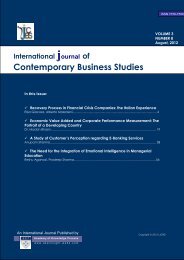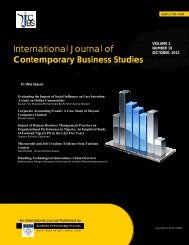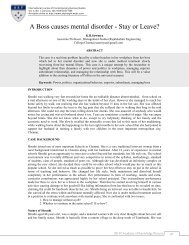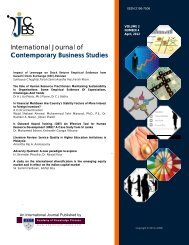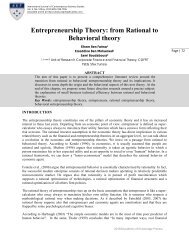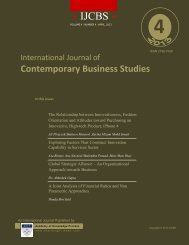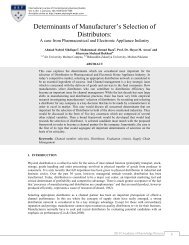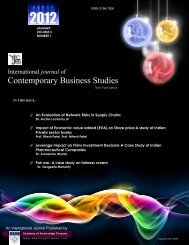International Journal <strong>of</strong> <strong>Contemporary</strong> <strong>Business</strong> <strong>Studies</strong>Vol: 4, No: 2. February, 2013 ISSN 2156-7506Available online at http://www.akpinsight.webs.comDiversification is increasing with every passing day, noted by many researchers (Datta, Rajagopalan andRasheed 1991, Hoskisson and Hitt 1990). Also it is favored and widely practiced by the Europeancorporate managers according to a survey (Kerin, Mahajan and Varadarajan 1990).Diversification helpfirms in shape <strong>of</strong> improved debt capacity and also it reduces the chances <strong>of</strong> bankruptcy by going into newmarkets. (Higgins and Schall 1975, Lewellen 1971), and improve asset deployment and pr<strong>of</strong>itability(Teece 1982, Williamson 1975). A diversified firm can transfer funds from a cash surplus unit to a cashdeficit unit without taxes or transaction costs (Bhide 1993).Diversification, firm size, and executive compensations suggest that it provide benefits specific tomanagers than investors (Hoskisson and Hitt 1990), creating agency problem (Fama, 1980) andmanager’s position to lose if they become unemployed, either through poor firm performance orbankruptcy (Bhide 1993, Dutta, Rajagopalan and Rasheed 1991, Hoskisson and Hitt 1990).It is top management which decides about the right quantity <strong>of</strong> diversification (Bhide, 1993) it can becostly (Jones and Hill 1988, Porter 1985) and put significant pressure on top management (McDougalland Round 1984).Current research on service industry regarding diversification suggest that service oriented firms shouldnot go for diversification (Normann 1984).Whereas, Nayyar (1993), stated that diversification based oninformation asymmetry has a direct positive relation with performance and negative when based oneconomies <strong>of</strong> scope in case <strong>of</strong> a service oriented firm.The Relationship <strong>of</strong> diversification andperformance is not clear in research. In recent reviews the scholars (Datta, Rajagopalan and Rasheed1991, Hoskisson and Hitt 1990, Kerin, Mahajan and Varadarajan 1990)analyzed that : (a) the empiricalevidence is unpredictable (b) Different disciplinary perspectives are chosen by different researchers.(C)The relationship is ambiguous and indicate influence <strong>of</strong> some other moderating /mediating variables. Thissituation is the basis for our study to place national culture as a moderator between internationaldiversification and performance relationship .Our notion is supported by social learning theory, nationalidentity theory in cross cultural research.National Culture as a ModeratorH<strong>of</strong>stede (1991) found that national culture elucidate 50% <strong>of</strong> the differences in managers' approach,thinking, and ideals. National differences are clearly seen in economic and political systems (Albert,1991; Thurow, 1993), educational systems (Calori et al., 1997), and other institutions (DiMaggio andPowell, 1983; Hall, 1986; Clegg and Redding, 1990; Sorge and Maurice, 1990).Thus, national culture differences among the parent and subsidiary company can be the major cause thatcan affect the relationship performance <strong>of</strong> both. While discussing the national culture dimension as amoderator between related resources and effectiveness <strong>of</strong> alliance performance, directly supported ouridea <strong>of</strong> placing national culture as moderator between international diversification strategy andperformance.(Barkema and Vermeulen ,1997). Previous research’s conclusion on national culturedifferences that it can upset the combination and learning among parent and subsidiary company.(Laneand Beamish, 1990; Parkhe, 1991; Lyles and Salk, 1996; Hennart and Zeng, 2002).Brock, et al (2000) studied how cultural differences in host and home country undernine or enhance theperformance <strong>of</strong> multinational acquisition and diversification. His study provided the basis to considernational culture as moderator between international diversification strategy and performance <strong>of</strong>multinational firm.Most <strong>of</strong> the researchers are <strong>of</strong> the view that national culture influences performance out <strong>of</strong> the country,but studies <strong>of</strong> the relationship between cultural differences and acquisition / diversification performancehas provided contradictory results (Weber, Shenkar, & Raveh, 1996). Child, Chung, and Davies (2003)2013©<strong>Academy</strong> <strong>of</strong> <strong>Knowledge</strong> <strong>Process</strong>90
International Journal <strong>of</strong> <strong>Contemporary</strong> <strong>Business</strong> <strong>Studies</strong>Vol: 4, No: 2. February, 2013 ISSN 2156-7506Available online at http://www.akpinsight.webs.comobserved that more favorable the environment in which cross border affiliate is operating the better willbe its performance.Performance <strong>of</strong> multinational organizations is the MNE performance has been aleading research subject, and many studies has considered cultural distance is an important forecaster <strong>of</strong>performance (Luo and Peng, 1999; Palich and Gomez-Mejia, 1999). For performance improvement ininternational diversification multinationals must reduce the production cost, increase sales and shareoverall risk <strong>of</strong> business. Some scholars found that higher diversity in cultures tend to decreaseperformance <strong>of</strong> multinationals. (e.g., Li and Guisinger, 1992; Chang, 1995).Luo and Peng (1999) argue that differences in national culture tend to lower performance when MNEsenter new markets. Cultural assumptions create environment and the nature <strong>of</strong> impacts within theorganization outcomes in control and strategy formulation. Scholars are in agreement about influence <strong>of</strong>national culture on performance in international diversification. But studies regarding cultural differencesand acquisition performance found disagreement in their findings (Weber, Shenkar, & Raveh, 1996). )Foreign entry road maps <strong>of</strong> alternatives by MNEs are explainable by cultural distance. (Harzing, 2003).culture distance between countries can be classified in accordance with their national culture.(Søndergaard,1994),.A way <strong>of</strong> thinking in between cultures the similar most important the matching <strong>of</strong>scores among cultural dimensions. (Schwartz, 1994).More cultural differences are linked with more diversity in decision making (Jemison & Sitkin, 1986).We can conclude from these findings that higher costs due difference in culture in integration phase is thereason for low performance <strong>of</strong> firms. This conclusion provides strong support for placement <strong>of</strong> nationalculture dimension as a moderator in our model <strong>of</strong> this study. Morosini, Shane, and Singh (1998) found asignificant positive relationship between cultural distance and performance.Harrison, McKinnon,Panchapakesan, and Leung (1995) propose that nations with similar cultural characteristics should begrouped together and compared with other bunch not similar in characteristics. Calori et al. (1994) andHarrison et al. (1995) all express culture to have a computable impact on a variety <strong>of</strong> facet <strong>of</strong> theorganization (including structure, creativity, and entrepreneurship). Mayrh<strong>of</strong>er (2004) explains theinfluence <strong>of</strong> cultural on merger-acquisition choices is noteworthy even among adjacent France andGermany.MODEL OF THE STUDYIndependent Variable Moderator Dependant VariableIDS=International Diversification strategyNCD=National Culture DimensionNCDI DSPerformanceUncertainty Avoidance has defined as the “extent to which members <strong>of</strong> an organization or society striveto avoid uncertainty by reliance on social norms, rituals, and bureaucratic practices to alleviate theunpredictability <strong>of</strong> future events.” (James.B.Hunt,2000) Extending H<strong>of</strong>stede's (1980) arguments, Shane(1992, 1993) found that nations with , weak uncertainty avoidance, had higher rates <strong>of</strong> innovation.2013©<strong>Academy</strong> <strong>of</strong> <strong>Knowledge</strong> <strong>Process</strong>91



